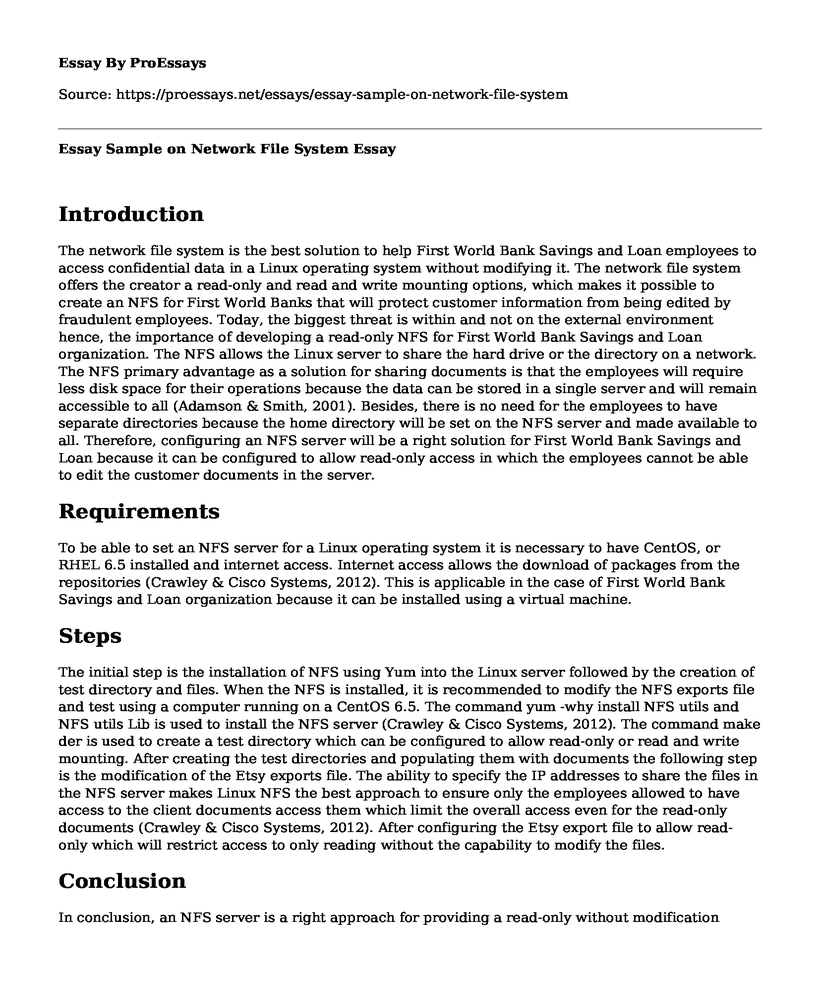Introduction
The network file system is the best solution to help First World Bank Savings and Loan employees to access confidential data in a Linux operating system without modifying it. The network file system offers the creator a read-only and read and write mounting options, which makes it possible to create an NFS for First World Banks that will protect customer information from being edited by fraudulent employees. Today, the biggest threat is within and not on the external environment hence, the importance of developing a read-only NFS for First World Bank Savings and Loan organization. The NFS allows the Linux server to share the hard drive or the directory on a network. The NFS primary advantage as a solution for sharing documents is that the employees will require less disk space for their operations because the data can be stored in a single server and will remain accessible to all (Adamson & Smith, 2001). Besides, there is no need for the employees to have separate directories because the home directory will be set on the NFS server and made available to all. Therefore, configuring an NFS server will be a right solution for First World Bank Savings and Loan because it can be configured to allow read-only access in which the employees cannot be able to edit the customer documents in the server.
Requirements
To be able to set an NFS server for a Linux operating system it is necessary to have CentOS, or RHEL 6.5 installed and internet access. Internet access allows the download of packages from the repositories (Crawley & Cisco Systems, 2012). This is applicable in the case of First World Bank Savings and Loan organization because it can be installed using a virtual machine.
Steps
The initial step is the installation of NFS using Yum into the Linux server followed by the creation of test directory and files. When the NFS is installed, it is recommended to modify the NFS exports file and test using a computer running on a CentOS 6.5. The command yum -why install NFS utils and NFS utils Lib is used to install the NFS server (Crawley & Cisco Systems, 2012). The command make der is used to create a test directory which can be configured to allow read-only or read and write mounting. After creating the test directories and populating them with documents the following step is the modification of the Etsy exports file. The ability to specify the IP addresses to share the files in the NFS server makes Linux NFS the best approach to ensure only the employees allowed to have access to the client documents access them which limit the overall access even for the read-only documents (Crawley & Cisco Systems, 2012). After configuring the Etsy export file to allow read-only which will restrict access to only reading without the capability to modify the files.Conclusion
In conclusion, an NFS server is a right approach for providing a read-only without modification solution to an organization which seeks to allow employees limited authority over client information. As such, the access IP addresses are mounted on the NFS server and given read-only mounting means that the LAN connection to the Linux server will allow the employees to access without modification powers.
References
Crawley, D. R., & Cisco Systems, Inc. (2012). The accidental administrator: Cisco router step-by-step configuration guide. Seattle, WA: Soundtraining.net.
Adamson, W. A., & Smith, K. M. (2001). Linux NFS Version 4: Implementation and Administration. In Proceedings of the 2001 Linux Symposium, Ottawa. Retrieved from https://www.kernel.org/doc/ols/2001/nfsv4_ols.pdf
Cite this page
Essay Sample on Network File System. (2022, Mar 04). Retrieved from https://proessays.net/essays/essay-sample-on-network-file-system
If you are the original author of this essay and no longer wish to have it published on the ProEssays website, please click below to request its removal:
- Security of Web-Enabled Small Devices - Essay Example
- Online Adult Education - Essay Sample
- Paper Example on Personal Data Protection in America
- Backups Security Issue Essay Example
- FIFO and LRU Cache - Research Paper
- Essay Sample on Cyber Terrorism
- How Big Data Uses Microeconomic Principles to Affect the Market - Essay Sample







